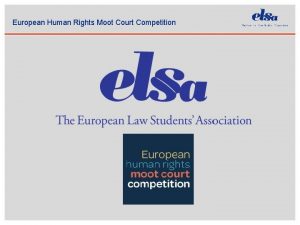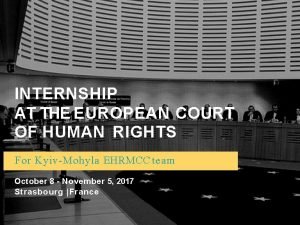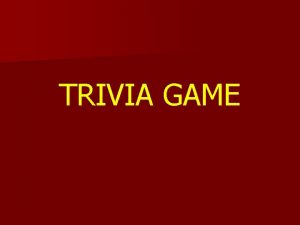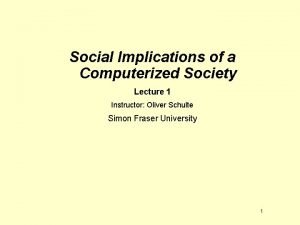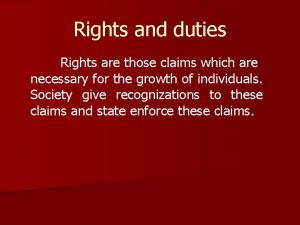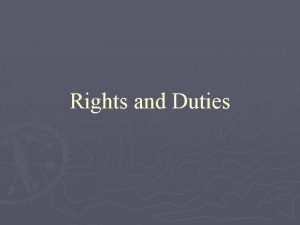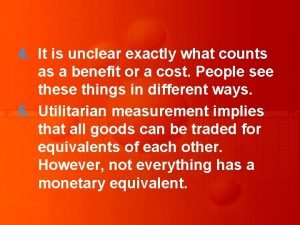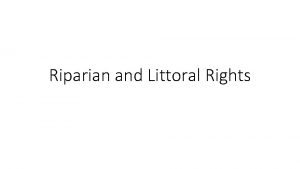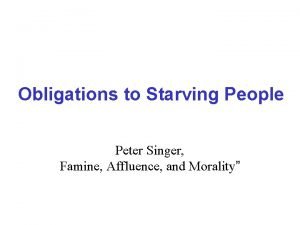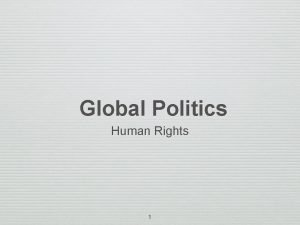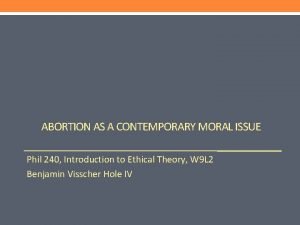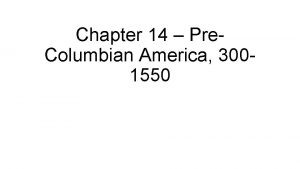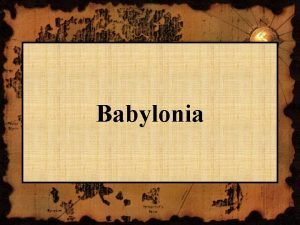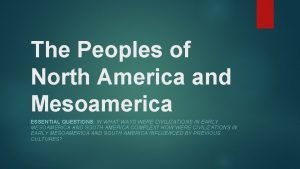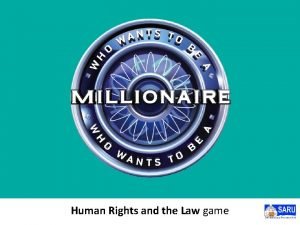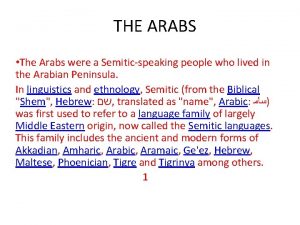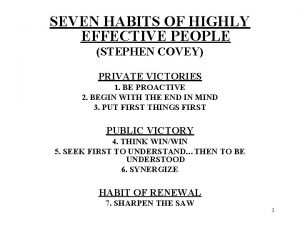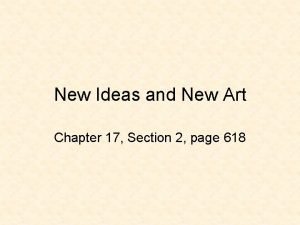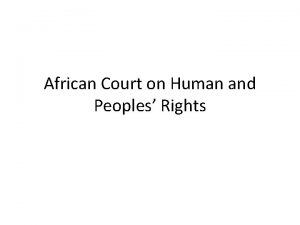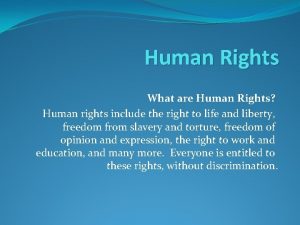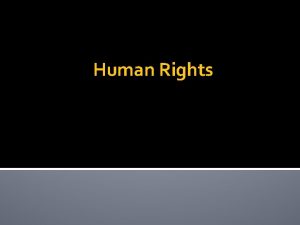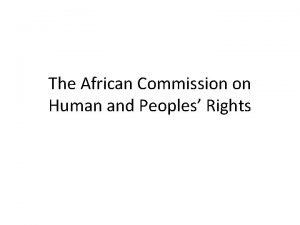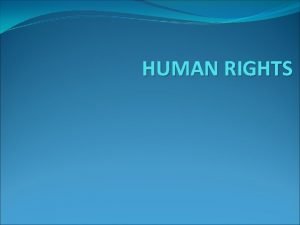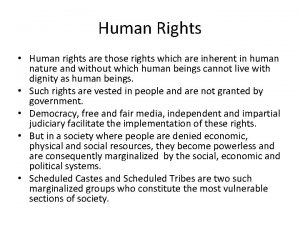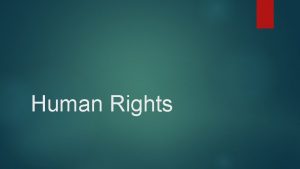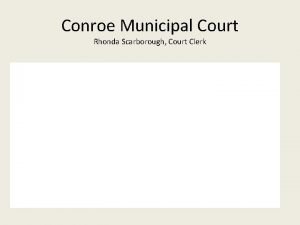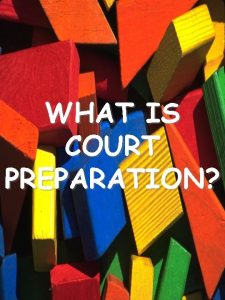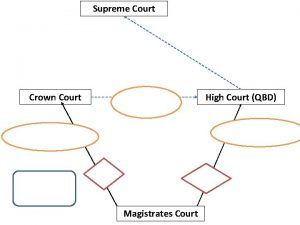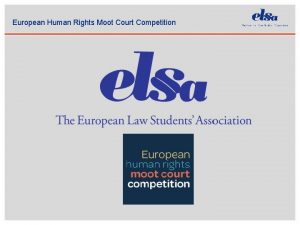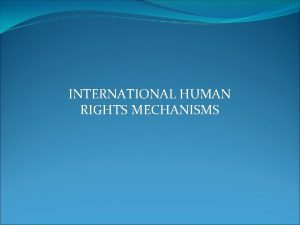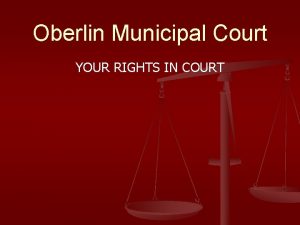African Court on Human and Peoples Rights African


















- Slides: 18

African Court on Human and Peoples’ Rights

African Court on Human and Peoples’ Rights • Set up by the Protocol to the African Charter • Ouagadougou, Burkina Faso, in June 1998 • Jurisdiction covers the interpretation and application of the African Charter, the Protocol and other relevant human rights instruments ratified by member States • The Court complements the protective functions of the Commission

Jurisdiction • ratione personae – whether the court has jurisdiction over both the complainant and the respondent State. This may be: – if a case is brought by a State party to the protocol, an African intergovernmental organisation, or the African Commission against any State party to the Protocol – if a case is brought by an NGO or an individual against a State party that has made a declaration under Article 34 (6) allowing direct access – if a case is brought by an African organisation seeking an advisory opinion • ratione materiae - whether the acts complained of violate the African Charter and other international human rights treaties • ratione temporis – whether the violation occurred after the State concerned had ratified the protocol establishing the Court and the Charter or the human rights treaty that is allegedly violated • ratione loci – whether the violations occurred within the territory of a State party. Extraterritorial jurisdiction?

Who Has Access? Article 5 Protocol • The African Commission on Human and Peoples’ Rights • State parties that were complainants or respondents to a complaint before the African Commission on Human and Peoples’ Rights • State parties that have an interest in a case • African inter-governmental organisations • Individuals and non-governmental organisations with observer status at the African Commission and ordinary individuals – but only when the State party against which the complaint is lodged has made a declaration allowing individuals or non-governmental organisations direct access to the Court (See Art 34(6))

• Seven countries have made the declaration allowing direct access: Burkina Faso, Mali, Malawi, Tanzania, Ghana, Rwanda and Côte d’Ivoire

African Commission According to Rule 118 of its Rules of Procedure, the African Commission may bring cases before the African Court in the following circumstances: • If the State has not complied or is unwilling to comply with its recommendations in respect of the communication within the stipulated time limit • If the Commission has made a request for provisional measures against a State party, and considers that the State has not complied with the provisional measures requested • If a situation of serious or massive violations of human rights has come to its attention or • If it deems it necessary to do at any stage of a Communication

African Commission v. Libya • During the conflict in 2011, NGOs brought a communication against Libya before the African Commission and asked for provisional measures. • The African Commission held that the situation was one of serious or massive violations and they referred the case to the African Court, which proceeded immediately to grant provisional measures (which were never complied with). • However, neither the African Commission nor the original NGOs followed up on the case – primarily because of a difficulty in gathering evidence during the conflict but also as a consequence of the change of government in Libya.

Direct Access • NGOs that do not have observer status before the African Commission will not be able to bring cases directly before the African Court (although individuals can often bring the same cases) (See Association des Juristes d’Afrique pour la Bonne Gouvernance v. Republic of Cote d’Ivoire No 006/2011). • As with the African Commission, admissibility is governed by Article 56 of the African Charter, which sets out a cumulative test of seven requirements. Each of these must be met for a case to be admissible.

Admissibility • What are the requirements under Article 56?

Admissibility Cases must: • Indicate their authors even if authors request anonymity • Be compatible with the Constitutive Act of the AU or with the present Charter • Not be written in disparaging or insulting language directed against the State concerned and its institutions or to the AU • Not be based exclusively on news disseminated through the mass media • Be sent after exhausting local remedies, if any, unless it is obvious that this procedure is unduly prolonged

Advisory Opinions • Another way in which the African Court may receive cases. • According to the Protocol, “any African organization recognized by the OAU [now the AU]” can seek an advisory opinion of the African Court. Pursuant to Rule 68 (1) of the African Court’s Rules of Procedure requests may be filed by: – – member States, the African Union, an organ of the African Union, or an African Organization recognized by the African Union.

Advisory Opinions • Advisory opinions must only be sought for the interpretation of the law and should not be an attempt to bring a case against a member State.

Advisory Opinions - Content of Request • The provisions of the Charter or of any other international human rights instrument in respect of which the advisory opinion is sought; • The circumstances giving rise to the request; and • The names and addresses of the representatives of the entities making the request.

Advisory Opinions - Examples • Socio-Economic Rights and Accountability Project (SERAP) asked the African Court, inter alia, to give an opinion on whether extreme and widespread poverty in Nigeria violated the prohibition of discrimination and whether poverty could constitute “other status” in the definition of discrimination in the African Charter. • The African Court held, without explanation, that the request did not meet the requirements of Rule 68. • This is rather unhelpful.

Advisory Opinions - Examples • African Committee of Experts on the Rights and Welfare of the Child • The Committee has standing to request an advisory opinion under Article 4(1) of the Protocol of the Court. • However, the Court did not find the Committee to be an “African Intergovernmental Organisation” within the meaning of Article 5(1)(e) of the Protocol.

The Media • In Norbert Zongo v Burkina Faso, the African Court found that Burkina Faso violated Articles 7 and 1 of the African Charter because it “failed to act with due diligence in seeking, trying and judging the assassins of Norbert Zongo and his companions”, contrary to “the rights of the Applicants to be heard by competent national courts. ” • The Court also held that Burkina Faso violated Article 9 of the African Charter’s protections of freedom of expression because its “failure … in the investigation and prosecution of the murderers of Norbert Zongo, caused fear and worry in media circles. ” • In Konaté v Burkina Faso, the African Court held that criminal defamation laws violated Article 9 and other international human rights norms protecting the right to freedom of expression.

Remedies • Re-open investigations (Zongo v. Burkina Faso) • Damages (Zongo v. Burkina Faso) • Repeal laws (Konaté v. Burkina Faso)

Cases • What would be your dream case to argue before the African Court of Human and Peoples’ Rights?
 European human rights moot court competition
European human rights moot court competition European court of human rights traineeship
European court of human rights traineeship Is there a basketball court above the supreme court
Is there a basketball court above the supreme court Negative rights vs positive rights
Negative rights vs positive rights Conclusion of rights
Conclusion of rights Legal rights vs moral rights
Legal rights vs moral rights Positive rights and negative rights
Positive rights and negative rights Littoral rights
Littoral rights What is negative right
What is negative right Negative right
Negative right Negative right
Negative right Lesson quiz 14-2 pre-columbian america answers
Lesson quiz 14-2 pre-columbian america answers Many territories and peoples controlled by one government
Many territories and peoples controlled by one government The peoples of north america and mesoamerica
The peoples of north america and mesoamerica Campaign definition in life orientation
Campaign definition in life orientation Human rights to live in dignity and justice
Human rights to live in dignity and justice Semitic peoples origin
Semitic peoples origin 7 habits of highly effective peoples public
7 habits of highly effective peoples public John calvin peoples
John calvin peoples
